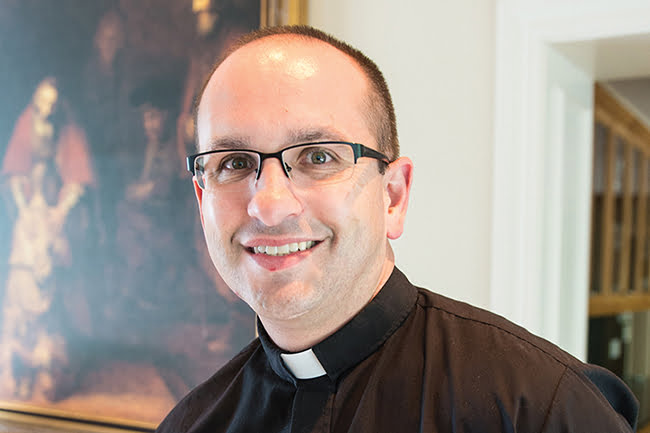
by Father Dan Morris
It’s the first thing I see as I enter my office: a large, nicely framed reproduction of Caravaggio’s “The Calling of Saint Matthew.”
The genius of the artist — as well as the genius and simplicity of the story that it depicts from Chapter 9 of Matthew’s Gospel —has become increasingly clear to me.
Captured by just a single verse in the Gospel — and by a single snapshot in time captured by Caravaggio’s brushstrokes—Jesus enters into the life of the young Matthew, directs his gaze and attention upon him and simply says, “Follow me.”
And then the real miracle happens. Without question or hesitation, the last line of that same verse concludes with the words: “And he got up and followed him.”
For the longest time, whenever I would read this story, I would balk at the immediacy of Matthew’s response. Was it really that easy? Surely, just like The Leaven does with me, the Holy Spirit had to have given the Gospel writer a word count forcing him to leave out some very important details!
I know answering God’s call hasn’t been nearly that easy for me. I had many questions, doubts and fears that I wanted Jesus to address before I was willing to follow him.
But that’s exactly what I’ve come to appreciate about the simplicity of the story. It’s the same simplicity found in nearly all of the call stories throughout the New Testament.
Whether it’s Matthew at the tax collector’s table — or Andrew, Simon, James and John along the shorelines of the Sea of Galilee —notice that Jesus doesn’t say anything about being a priest.
He simply says, “Follow me,” inviting them to trust and see that the details of their particular vocation — their questions, doubts, fears, and desire for increasing clarity — are only things that can be addressed and resolved in proportion to their willingness to enter fully into this friendship and journey.
As we know from the rest of their stories, following Christ is a journey that consists of learning how to pray (Lk 11:1-13); learning how to read and understand Scripture (Lk 8:9-15); participating firsthand in Jesus’ mission and ministry (Mk 6:7-13); and dining with him in the celebration of the Eucharist at Mass (Jn 6:53-56; 13:1 – 17:26).
For any disciple, this leads to a particular type of falling in love (Jn 21:15-19). In discovering that our vocation is about how we can share most fully in the life of the one we love, we come to realize that the details no longer matter.
Having fallen in love, we now find ourselves willing and desiring to follow Christ whenever and however he calls.

